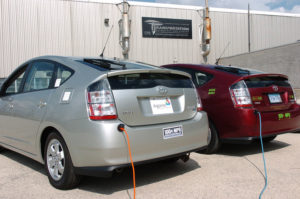
Plug-In Hybrid Electric Vehicles (PHEV) are tested at Argonne’s Transportation Technology R&D Center. September 15, 2006. USDOE photo.
Is it realistic to assume that electric vehicles (EVs) are going to dominate the automobile market in the near future? Can they even? Those are the questions automobile companies are constantly looking for answers to. At Toyota, the power resides with the realists. River Davis reports:
Toyota’s TM -0.99%decrease; red down pointing triangle chief executive always said he wasn’t a skeptic about electric vehicles—he was a realist.
Longtime CEO Akio Toyoda called himself a spokesman for “a silent majority” of people in the auto industry who questioned a single-minded focus on EVs. He argued that hybrid gas-electric vehicles like Toyota’s Prius could be just as environmentally friendly, and said other companies were pushing consumers to make a leap into EVs that they might not be ready for, without a charging infrastructure fully in place.
Then, last week he handed the reins of Toyota to a successor.
“When it comes to digitalization, electrification and connectivity, I personally feel that I belong to the older generation,” said Mr. Toyoda, 66 years old, in announcing that 53-year-old engineer Koji Sato would take over as president and CEO in April, while Mr. Toyoda would become chairman. “For me to take a step back is important.”
The transition is a landmark moment not only in the car industry but in the complicated shift to green energy throughout the business world. Some companies, investors and governments are pushing for big leaps into renewable energy and green technology, arguing that the consumer and the infrastructure will catch up to the changes. In the auto world, Mr. Toyoda is among those who have advocated for moving more slowly and deliberately.
Meanwhile, government agencies and investors are incentivizing companies to move into EVs with subsidies and tax breaks. New EV tax credits in the U.S. law dubbed the Inflation Reduction Act don’t apply to hybrids that don’t plug in.The European Union has mandated zero-emission new car sales by 2035. The state of California will also only allow new sales of EVs, plug-in hybrids and hydrogen-cell vehicles beginning in 2035.
EVs are taking growing chunks of the European and U.S. markets, and one fifth of the world’s largest car market, China, already consists of EVs.
Read more here.
